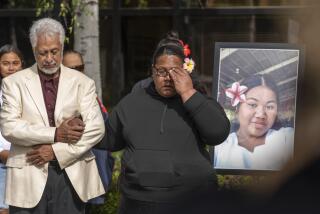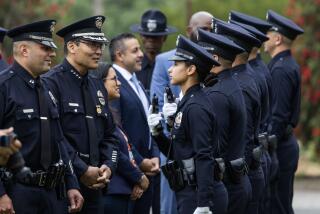Navajo Tribal Police Patrol the Lonely Way
- Share via
KAYENTA, Ariz. — Police in Kayenta don’t like to admit it, but it terrifies them to think of how Officer Hoskie Gene died--his crumpled, beaten body left in the dirt like trash alongside the remote highway in the silent desert night.
Gene was the only cop on duty when he headed off alone to a robbery call an hour away on the sprawling Navajo reservation. He kissed his girlfriend and promised they would be together at the end of his shift.
Soon after, he lost communication with the dispatcher. Hours later, he was found strangled amid broken beer bottles, his weapon and vehicle stolen.
He died as he worked: alone.
“Sometimes there might be one or two other [officers] out there,” said Officer Martin Page, gesturing toward an endless horizon of red-rock formations and valleys where radio talk crackles and dies. “That is, if they can hear you. When you’re dealing with no backup, you’re by yourself wherever you go. That’s just the reality.”
This is Kayenta, where five officers patrol 4,100 square miles of brutal poverty and uncompromising desert, where headquarters is a worn-out trailer and the nearest hospital is an hour and a quarter if you speed. They are responsible for 15,270 people.
In some ways, police in this dusty, one-stop-sign town on the Arizona-Utah border aren’t unlike those in other rural, poor districts across the nation, typically working alone and an hour or more from help should they need it.
For Navajo officers, however, the task is compounded by the reservation’s horrifying host of social ills: unemployment, alcoholism, suicide and murder rates multiple times the national average.
This scenario has been more than challenging for police here--it has been deadly. In the last nine years, three officers were murdered on the job, one committed suicide, and another was jailed for killing his wife.
“They’re just like walking on this emotional roller-coaster,” said Capt. Thomas Yazzie, who oversees criminal investigations at Kayenta and Tuba City, another district about 75 miles west of here. “They get burned out. They are asked to do something that can’t be done.”
*
No one disputes that lack of manpower is what killed Gene one cold night last January. It is also blamed for the murders of Officers Andy Begay and Roy Lee Stanley in December 1987.
To this day, officers fear driving alone down the dirt roads in Monument Valley, where Stanley was attacked after checking on a bonfire party. After his distress calls to the dispatcher disappeared in the red-rock mountains, Stanley was forced by his youthful assailants to radio Begay, who was nearby. The two officers were then shot with their own weapons, shoved in the back of a police vehicle and set ablaze.
“Kayenta is more risky than other districts,” said Officer Calvin Lee Gishie, a stocky, 25-year-old who has come from another district to help out. “Like right now we’re the only ones out here.”
Stopping to back up a state Department of Public Safety officer on the highway, Gishie notes the other officer’s state-of-the-art computer and radar system. His own car has an antiquated radio.
Many of the vehicles police rely on to traverse the district’s rocky, dirt roads have 150,000 miles on them, or more. Officer Jim Tsosi’s has a cracked windshield. The lights atop Gishie’s spin, but they don’t light up.
Because it takes so long for officers to respond to calls, police say people often abandon the scene of fatal accidents and crimes. By the time an officer arrives at a domestic incident, the fighting may be long over and the victim no longer interested in pressing the case.
Most people live in remote spots without paved roads, running water or telephones, forcing them to find the rare neighbor with a cellular phone or actually drive to the police station if they need help. Often hours or days pass before police hear of a crime and are unable to gather evidence.
And even when police do arrest people, there’s nowhere to put them.
The six jails in the 25,000-square-mile reservation can hold less than 60 sentenced inmates; tribal police make 27,000 arrests each year. In some cases, inmates live in cells meant only for temporary holding. In most cases, they are freed.
“While they’re coming in one door, people are being pushed out the other,” said Police Chief Leonard Butler. “There’s really no consideration for what they’ve done. There is just no room.”
The citizenry knows that the police are overwhelmed. The store owner who reported the robbery the night of Gene’s murder still cries when asked about it; others have blamed him for the killing. Things being what they are, they say, you shouldn’t summon the police unless it’s a matter of life or death.
“We know how incredibly stretched they are, sometimes you have to wait hours,” said Lori Hood, who runs Kayenta’s public health clinic. “But even if they do come, nothing will happen. Folks in town don’t have a whole lot of faith in the Police Department. No one’s afraid of the police.”
*
Navajo officers mirror their community. Alcohol and drug abuse, divorce, domestic violence or suicide seem to touch nearly every life, from the dispatcher to Chief Butler, who has battled alcoholism and has been divorced three times.
Shortly before he was murdered, Gene shared his home with Officer Martin Page; both men had been having marital problems, and Page said Gene told him that his estranged wife had run over his foot with her car.
“He said to me, ‘Man, what’s going on?’ ” Page recalled.
Compared to the national average, unemployment is five times greater on the reservation, average income is three times lower, teen suicide is twice as high. Murder rates are as many as five times those of neighboring counties and several times the national average.
More than 80% of all police calls involve alcohol. The drug is illegal on the reservation, leaving people who can’t reach border stores to drink concoctions such as “ocean,” a mixture of rubbing alcohol or hair spray mixed with water.
All this ugliness takes place amid almost breathtaking beauty.
For decades, filmmakers, photographers and commercial producers have come to Monument Valley for its vast blue skies, mighty red-rock mountains and sunsets that transform the desert into a serene orange moonscape.
“The isolation seems so lovely to me,” said Tony Hillerman, renowned author of 13 mystery novels about Navajo cops. “Officers have complaints where someone sets on fire a ceremonial thing or something to get back at someone else. It’s not the kind of thing a Chicago cop would have to deal with.”
But police say things have changed.
“When I started in 1971, a lot of our time was taken up with livestock being shot or windmill disputes,” Butler said. “Now, in one week I’ve got two fatal accidents, one suicide and five people killed. There are times when you don’t want to go to work anymore.”
*
When Gene died, Kayenta’s officers cried out. They felt isolated, they told Butler, forgotten and unprotected.
Since then, they have been promised a few more officers from the next graduating class. But no dramatic change is on the way.
About 80% of the Navajo Police Department’s money comes from the federal government, through the Bureau of Indian Affairs. In recent years, the tribe has asked for about $30 million a year, but has received only about $17 million.
On the one hand, BIA officials say, Congress has cut back on law enforcement funding everywhere; on the other, the tribe badly mismanages the money it gets. They note the tribe usually ends each year with about a million dollars in unspent funds.
The Navajo can “make the necessary changes themselves,” said Wilson Barber, who administers BIA funds for the Navajo Nation. “I think the focus on the dollars is being used as a crutch as to why they can’t manage.”
Other BIA officials disagree. The tribe, they say, could use all it requests, and more. Either way, life for Kayenta cops isn’t likely to change soon.
“There isn’t a lot of prestige in being a police officer in a traditional society. So you do it because you love it,” said Tsosi.
And Gene did, said Yazzie.
“I went to his graduation and just congratulated him. He said it was what he always wanted, to be a police officer,” he said. “Despite all the problems, it was all he ever wanted to be.”
More to Read
Sign up for Essential California
The most important California stories and recommendations in your inbox every morning.
You may occasionally receive promotional content from the Los Angeles Times.













